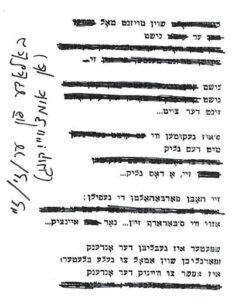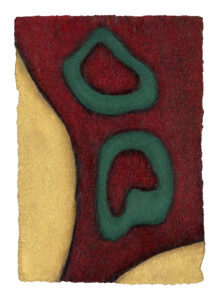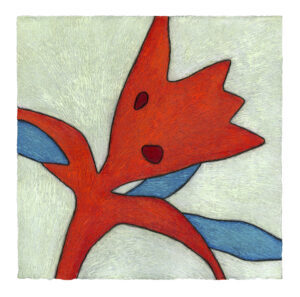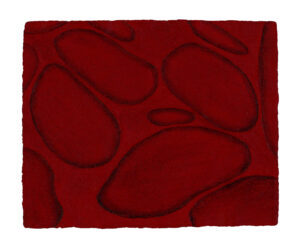Zackary Sholem Berger's Blog
October 28, 2021
Rewriting the erased: Dvoyre Fogel
In a richly diverse issue of In geveb: A Journal of Yiddish Studies devoted to inhabiting and examining the work of poet and thinker Dvoyre Fogel, I have the honor to participate with chutzpahdik poems of erasure, finding verse in the disappearance of memory. Thank you to the erudite, careful and patient editors.
September 5, 2021
Why vaccine passports are ineffective and inequitable
In the Globe and Mail, Andray Domise and I argue that Covid vaccine passports are no solution, victimizing those we should be helping.
August 18, 2021
The Truth About Long Covid Is Complicated. Better Treatment Isn’t.
Adam Gaffney and I wrote an op-ed for the New York Times on Long Covid. The take away? The causes of Long Covid are multiple; pharmaceutical cures are unlikely; but the route to treatment is clear.
July 5, 2021
Thou Art
New poem published in South Shore Review:
I am not the same person I was
When assigned to this world as dust
A thin particulate layer like the surface of the moon
Imprinted by what last landed there. Soon
I will blow somewhere in an assignation.
I’ll drift onto your tongue as an affirmation.
A second later you’ll swear I never happened.
This is half-true. I never penned
The answers to the query my life asked.
I never organized. I rarely multi-tasked.
Yet there was something the dust says.
Never invited but with all the s’il-vous-plaits.
What is the meaning of all the flattened softness?
What if I’m adrift, unsung, unsought, no Loch Ness?
Meaning is a construct. Dust: eternal layer.
Biome is speculative. Planet steals from air.
Our species creates its own betrayed collective.
It dies into the dust. It rises again to let live.
Poetry of sacrifice from a heretical point of view
In her new, acutely perceptive, richly illustrated book of verse, the poet Alisha Kaplan thinks through the physical and psychological implications of sacrifice based on her own experiences, family history, joys and sorrows, physicality and spirituality.
More in the Forward.
June 16, 2021
אַ נײַע פּאָעזיע־זאַמלונג אַנטפּלעקט רוחניות דורך אַפּיקורסות
װי די בעסטע פּאָעטעסעס, שאַפֿט אַלישאַ קאַפּלאַן אַ מעכטיקן, מיטרײַסנדיקן ייִדישן מיטאָס מיטן בױ־מאַטעריאַל װאָס זי האָט צו דער האַנט: איר געשיכטע, איר משפּחה, ייִדישע טראַגעדיע – און איר אײגענעם גשמיות. מײַן רעצענזיע אױף איר ענגליש־שפּראַכיקן, רײַך־אילוסטרירטן באַנד „קרבנות“.

My review in Yiddish of Alisha Kaplan’s multidimensional English-language book of poetry, Qorbanot, which (like all successful myth-making) draws on materials she has at hand: her personal stories of embodied adventure and departure; her family’s tragedies and survivals; and the concept of sacrifice itself. Well worth reading (as is clear from the review).
https://forward.com/yiddish/471468/a-...
April 20, 2021
The Mesh: a poem [published in Jersey Devil Press]
Every day ties another knot
In the net, and I haven’t got
An instruction book, or a thought
Which coaxes to loosening.
Time will unbind. Or the ending
Of time might mean unwinding.
The night angles shut like a lid.
The day collapses, is elided
Into a mesh of what I did
Or did not. Tangled up and closed,
I watch the dipping sun lose
Itself in the basin of chatzos.
Link to the online version here
December 21, 2020
#BehindTheMask, December 15

The vaccines are good, and (personal note!) I’d like one as soon as possible. I’m a healthcare worker enrolled in a lottery. I’m fine, but I’m impatient.
But if “science” is credited with the vaccine, science should also be asked how the vaccine is going to be distributed to the same people and groups who science (in its institutions, practices, leaders, and funding streams) has by-and-large ignored, or neglected, in testing and treatment.
If you’re undocumented?
If you’re in jail?
If you’re homeless?
If you speak a language other than English?
How is the vaccine going to get to you, especially if you are still expected to show up at work, or you don’t have the means to get to the clinic, or the bus isn’t running, or you need to concentrate on feeding your family?
The actions of inequity are just as much a part of science as the inspiring advances of virology.
By the same token, “listening to science” means that our incoming president, and our healthcare institutions, should take heed of multiple realms of knowledge which help describe human behavior in time of pandemic. Yes, T-cells and B-cells, but also sociologists, anthropologists, economists, and ethicists.
Listening to science means knowing when to pursue complexity and not reductionism in understanding why people don’t get vaccines.
It also means understanding what drives health inequities, and what measures a society will not take to prevent the death of its vulnerable. Because the gaps in its care are written into its laws, inscribed on the bodies of its oppressed and enslaved.
November 16, 2020
A new translation!
Behind the Mask, November 15
Mutual aid groups have a long history, which I’m not expert enough to summarize well. Suffice it to say while many find the roots of such groups in anarchist thought (which I’m not opposed to, though it’s not my particular ideology), they are prominent in many cultures and traditions. To take a history I’m familiar with, even as diasporic Ashkenazi Jews existed in various situations of imperfect or absent autonomy, mutual aid as a concept played an important philosophical role. (I acknowledge and bracket that in practice such aid was often straight-up charity, not mutual aid, and hierarchical in nature.)
My suggestion here is that mutual aid groups are potentially palatable in this historical moment to those on various parts of the spectrum who find existing institutions untrustworthy or in violent opposition to their ends. One need not agree with the inimical ends of Trumpers, for instance, to see them as human beings in need of assistance, and potential elements of a wider network that might be linked up for the benefit of all.
What are your experiences and expectations of such groups, and do you agree with their potential utility even in the absence of, even not desiring, ideological agreement?





